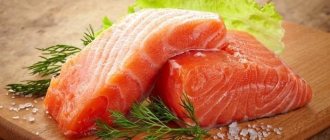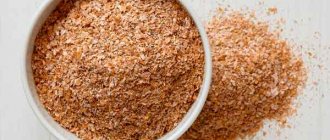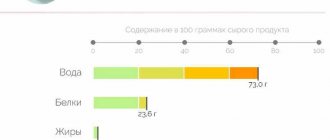There is a widespread belief that frozen vegetables are a harmful semi-finished product that has nothing healthy. However, research suggests otherwise. In fact, most frozen and fresh vegetables are similar in vitamin and mineral content.
A role is also played by the fact that during storage at room temperature, vegetables can lose nutrients, while freezing helps preserve them. How to properly cook frozen vegetables to maximize their benefits? Which mixtures are suitable for weight loss and which are harmful?
Historical reference
In general, the idea of freezing food did not arise yesterday: residents of northern countries have long preserved freshly caught fish in this way. It was laid out on ice; under a strong icy wind, the catch quickly froze and could be stored for a long time (in the cold, of course). American inventor, entrepreneur and naturalist Clarence Frank Birdseye, while on an expedition to the Canadian Labrador Peninsula in 1912, drew attention to this method of preserving food and decided to test it in action upon returning home to New York. Birdseye made artificial ice and conducted a series of experiments. The scientist discovered that when frozen slowly, large ice crystals form in food, which destroy tissue, and after thawing, the taste of such food leaves much to be desired. But if cooling occurs quickly, the quality of the product does not suffer. Birdseye acquired a patent for his invention, sold it to General Foods for $22 million in 1929, and the first frozen vegetables appeared in stores in 1930.
The benefits and harms of frozen vegetables
Frozen vegetables should be talked about more from a positive point of view.
With modern freezing methods, vegetables retain almost all their positive properties.
Very little time passes from the moment of harvesting to freezing - this is in the interests of the producer. Otherwise, the product will lose its appearance and even when frozen, it will be clear that it is spoiled.
IMPORTANT: When buying frozen vegetables, still pay attention to the composition. In rare cases, to preserve the appearance and add brightness to vegetables, manufacturers resort to the use of food additives.
Short harvesting times for vegetables guarantee excellent preservation of products.
However, frozen vegetables can also be harmful - but only if they have been frozen two or more times. When thawing, vegetables may simply go bad.
The benefits and harms of frozen vegetables
Vegetables are “shocked”
Just a few decades ago, producers simply placed the fruits in a huge freezer for several hours. Nowadays they use another, faster method called blast freezing. It allows you to preserve the maximum amount of valuable nutrients in vegetables and fruits, mushrooms and berries, as well as their taste and attractive appearance. The fruits are placed in chambers with a temperature of minus 35–40°C and blown with streams of cold air for 20–30 minutes. In this way, vegetables and fruits are frozen very quickly, small ice crystals are formed in them, which do not destroy the tissue structure.
Isn’t it better to freeze the fruits of the summer harvest at home, you ask? Let us answer directly: no, not better. The fact is that household freezers cannot provide the necessary conditions for rapid freezing. The temperature will drop gradually, the juice will turn into large ice crystals, cell membranes will be damaged and the lion's share of nutrients will be lost.
What types of frozen vegetables are there?
Considering that almost all existing vegetables can be frozen, you can find a huge selection of frozen vegetables and their mixtures on the shelves of shops and supermarkets.
The most common vegetables in demand among our citizens are:
- Black Eyed Peas
- Cauliflower
- Broccoli
- Polka dots
- Corn
- Eggplant
- Pepper
- Brussels sprouts
- Zucchini
- Mixtures of the above vegetables with the addition of celery, onions, carrots, etc.
Huge selection of vegetables for freezing
Frozen or fresh?
Now let's return to the dispute we outlined at the very beginning. So which vegetables are healthier: fresh or frozen? If by “fresh” we mean those collected at your dacha, they are undoubtedly better than store-bought ones. But with stores, the situation is different. According to recent studies by both our and foreign scientists, frozen vegetables contain significantly more nutrients than their “fresh” counterparts coming from countries of “eternal summer”. When frozen, fruits lose less vitamins and minerals than during long-term transportation. In addition, it is no secret that vegetables and fruits (usually unripe!) are treated with all sorts of chemicals before being sent on a long journey so that the food does not spoil.
However, not everything is so rosy with frozen fruits. They may contain both dyes (which unscrupulous people write about on the label) and GMOs. How critical this is - judge for yourself. This is what Andrey Mosov, head of the expert department of NP Roskontrol, a doctor, told us:
— Theoretically, GMOs may appear in mixtures that include vegetables for which genetically modified analogues exist and are cultivated on an industrial scale: soybeans, corn, potatoes, tomatoes. These ingredients are most likely to be found in mixtures containing soybean sprouts or corn. There is nothing wrong with this, but the manufacturer is obliged to disclose the presence of GMOs in the product labeling. Much more important for the consumer is information about the nutritional value, botanical variety of a fruit or vegetable crop and the region of its growth. Indication of such information in the labeling always speaks in favor of the manufacturer, being an indirect sign of his good faith.
Conclusion
Frozen vegetables, while not as good as fresh ones, usually retain most of their nutritional value and are an excellent storage method. Frozen vegetables are useful to eat in winter, when there is practically no alternative. The benefits of freezing can only be rivaled by natural fermented products without vinegar.
Frozen vegetables can be a nutritious and convenient addition to a balanced diet, but are not a substitute for our traditional seasonal produce such as beets, carrots, onions, cabbage, turnips, pumpkin, etc. It’s better to resort to traditional methods of preparing food for the winter, namely, ferment cabbage, cucumbers, tomatoes and apples without vinegar.
Be healthy!
Choose wisely
If we are talking about frozen fruits in packaging, then preference should be given to well-known brands - they care about their reputation, so they are more attentive to the selection of raw materials and control at each stage of production.
The temperature of the freezer where the fruits are located should be no more than –18°C. If bags of vegetables, fruits or berries are covered with frost, it means that the temperature regime is not being maintained, which, again, affects the quality of the product.
Feel the packaging (it should be intact, without tears or scratches). If you feel ice blocks at hand, refuse to purchase: such a product has been defrosted and re-frozen, which means you will not get any pleasure or benefit from such vegetables and fruits. The labeling must contain complete information about the contents and manufacturer, composition, freezing method (it is better to choose quick-frozen or blast-frozen), as well as the presence of GMOs.
Is it worth purchasing loose frozen vegetables, fruits, and berries? It is difficult to answer this question unambiguously. On the one hand, in this case you clearly see what you are going to buy. On the other hand, unfortunately, it is impossible to be sure of the freshness of products of this kind, even if tags indicating the date of packaging are attached to the trays.
And finally, let’s note that you should purchase frozen vegetables before you get ready to go to the checkout. It’s better if they “arrive” home in a cooler bag. And immediately put frozen food in the freezer! At a temperature of –6°C they can be stored for 1–2 weeks, at –12°C for 4–6 weeks, and at –18°C for up to 1 year.
Sergey Kukota">
The best producers of frozen vegetables
There are a huge number of producers of frozen vegetables and mixtures on the Russian market. Leading positions are occupied by Polish manufacturers.
Among the most popular brands are the following:
- "Hortex"
- "Kholodnya Zgoda"
- "Agram"
- "Khortino"
- "Bauer"
- "4 seasons"
- "Snezhana"
- "Colors of Summer"
- "Elikom"
- "Sap"
- "World Food" etc.
It is worth noting that most often domestic producers act not as producers, but as assemblers and packagers of vegetables supplied, for example, from Poland.
Don't get too hung up on a particular brand—try out the vegetables and you'll find plenty of freezer bags you love.
Vegetables in bags
How and what to cook
Remember that frozen vegetables should not be washed. And there is no need to defrost them before cooking. The best way to get a truly healthy dish is to quickly boil the vegetables in a little water or steam them. Immerse them in boiling water while frozen and season them just before eating. You can simply season the vegetables with salt and pepper, pour over vegetable or melted butter, one sauce or another, sprinkle with grated cheese or chopped herbs.
If the dietary option of cooking vegetables is not for you, use your imagination! Frozen Brussels sprouts, for example, can be stewed with pork or chicken. Broccoli and cauliflower - roast or bake in a creamy sauce. Green beans, corn, and peas are great for preparing first courses. By the way, all the above-mentioned vegetables can be supplemented with fresh ones to give the dishes a brighter taste. Well, frozen berries and fruits can become the basis for an incredible number of desserts or drinks.
Can I eat frozen vegetables?
Eating frozen vegetables is one of the simplest and most cost-effective ways for the body to obtain important vitamins, minerals, and trace elements during the winter.
In the age of technology, we can safely say that frozen vegetables are sometimes much healthier than vegetables bought in stores. Numerous studies also speak about this.
Can you eat frozen vegetables?
Ready-made solutions from Miratorg
Miratorg frozen products are delicious mono-vegetables and harmonious combinations of various ingredients. The products will save your time and delight you with a delicious lunch or dinner. The range also includes mixtures for culinary experiments, for recipes from different cuisines of the world. Each package is carefully formulated to provide you with a balanced diet.
Canadian, Italian, Portuguese, Caribbean and other mixtures are popular. In addition, you can purchase ready-made dishes with vegetables. They should only be heated in the microwave or oven. For example, sauté with Provençal herbs, potatoes with chanterelles, couscous with vegetables in sauce, quinoa with vegetables and others.
A variety of frozen kits will allow you to update the traditional home menu. Many mixtures are supplemented with aromatic herbs and other spices. Flavor combinations are thought out to the smallest detail.
Buy frozen meals for your table in our store. To do this, you can use the shopping cart on the website. Delivery operates in Minsk and the Minsk region. When ordering over 30 rubles on weekdays, we will deliver the products for free.
How to deliciously prepare frozen vegetables?
The product can be used as a side dish or a separate dish for a healthy dinner or lunch. The most popular culinary option is steaming. The ingredients are laid out on the prepared structure. This can be an electric steamer or a special saucepan. The dish will be ready in a matter of minutes. Preparation information is often indicated on the packaging.
Other interesting ways include sautéing or baking. Vegetables are often cooked in the oven with cheese. Dishes can be served with various dressings. You can buy delicious sauces in Minsk in the online store Food-store.by. Here you will find a large number of healthy dressings, hot, sweet, sour and other sauces.











